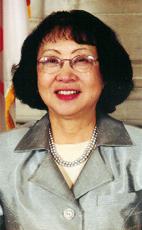Mr. Speaker, it is with great pleasure that I speak in this House today to express my support for Bill C-18, legislation that will enhance safety and security for all Canadians.
The bill will strengthen our customs officers role in law enforcement by extending the scope of their powers so that they can arrest and detain individuals suspected of committing offences under the Criminal Code.
As the Minister of National Revenue has pointed out, the legislation will close a longstanding gap in our ability to better control criminal activities such as impaired driving, child abduction and possession of stolen goods at the border.
It will also allow us to deal with individuals who are the subject of outstanding arrest warrants. There is a clear need for customs officers to be able to stop criminals and suspected criminals at the border before they have a chance to enter this country.
British Columbia has many major borders which process travellers and commercial traffic coming to Canada.
Much of the criminal activity observed by our customs officers is reported at the borders. On the national level, possession of stolen goods is up by over 250%. The number of outstanding warrants is also up by close to 95% and the incidence of missing children increased by 16%. Impaired driving continues to be a cause for concern.
Those numbers are startling. Canadians expect us to do what we can to keep this community safe. Bill C-18 is one way that we can meet those expectations.
A modern customs organization is what we expect to have. Over the last few years Revenue Canada has begun a process of transforming the customs program. That transformation has produced one of the most modern, efficient customs organizations in the world.
The department has adopted new technology and new techniques such as risk management to respond to the reality of facilitating trade and tourism. The fundamental changes now under way in our customs program recognize that most clients obey the law.
Revenue Canada takes its responsibility to protect Canadians seriously and it is my belief that Bill C-18 serves as one more tool for modern customs organizations to fulfil their enforcement mandate.
Customs officers already have the power to detain and arrest individuals suspected of offences under the Customs Act. Our officers already deal with offences as serious as the smuggling of drugs and weapons. Bill C-18 will extend those powers to include Criminal Code violations. It will allow customs officers to deal with crimes that are repugnant to most Canadians.
My colleagues in the House recently received a letter from the union representing customs officers which indicates its support and the support of its members for Bill C-18.
Attached to that letter is a letter from a customs officer who works at the port of Windygates, Manitoba. In it the officer recounts a recent experience he had with an obviously impaired motorcyclist. Unable to detain this individual, the officer had no choice but to let him proceed on his way. One kilometre beyond the port the motorcyclist lost control and was killed.
In his letter this concerned customs officer pointed out that the ending of the story may have been different if he would have had the power to legally contain this motorcyclist.
Bill C-18 will allow customs officers to use their unique position at the border to act as a first response against crime. This means that customs officers will be able to legally hold suspects until law enforcement agencies can intervene. Therefore, that will increase their chances of catching those people at the right time.
What about partners in law enforcement? Let us be clear. The legislation is not intended to make customs officers a replacement for police. As we mentioned earlier, it will close a longstanding gap and will give customs officers a stronger role in law enforcement as they work in co-operation with police agencies across the country.
Police officers, police chiefs, attorneys general all know that this will enhance our ability to catch criminals at the border. Giving customs officers more power will help the police to do their job more effectively.
The legislation has a broad base of support among the law enforcement community of this country. We have consulted broadly with law enforcement agencies and officials and we have their support.
Customs officers will not have the power to investigate Criminal Code offences, nor will customs officers have the power to prosecute Criminal Code offences. That will remain the responsibility of provincial law enforcement agencies.
It is also not our intent to provide firearms to our officers as a result of this legislation. We have studied this issue carefully and have concluded that it is not necessary.
We are entrusting these powers to a group of men and women who prove their value to this country every day as skilled, dedicated professionals.
In 1995-96 our customs officers processed over 106 million people at the border. The department received only 448 complaints about the conduct of officers. This represents a one-to-nearly 240,000 ratio. I think those statistics speak very highly of the professionalism with which customs officers do their job.
Once Bill C-18 is passed it will take six to nine months to implement this initiative. We will use that time to renovate facilities, designate officers and train them on the identification of Criminal Code offences and related court jurisprudence.
Customs officers will have the training and tools they need to carry out their new duties in a professional and responsible manner. Canadians can be assured that men and women who are paid to protect our border will continue to do so with the same skill and dedication that they have come to expect.
In conclusion, I urge my colleagues in the House to support Bill C-18. I am sharing my time with a colleague, the member for Sarnia—Lambton.

